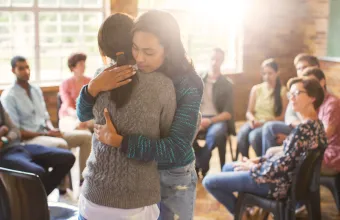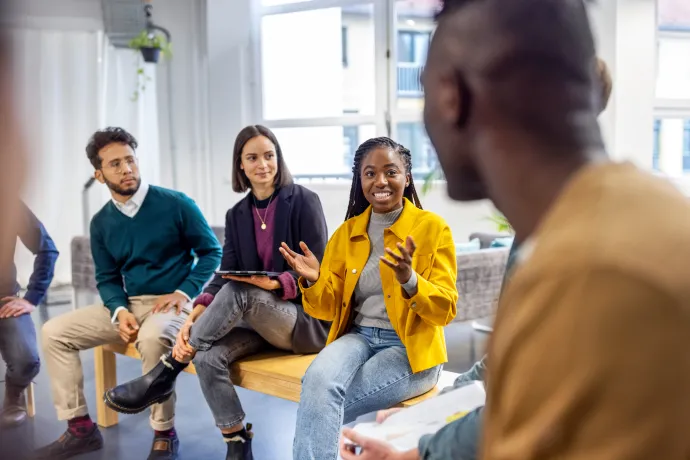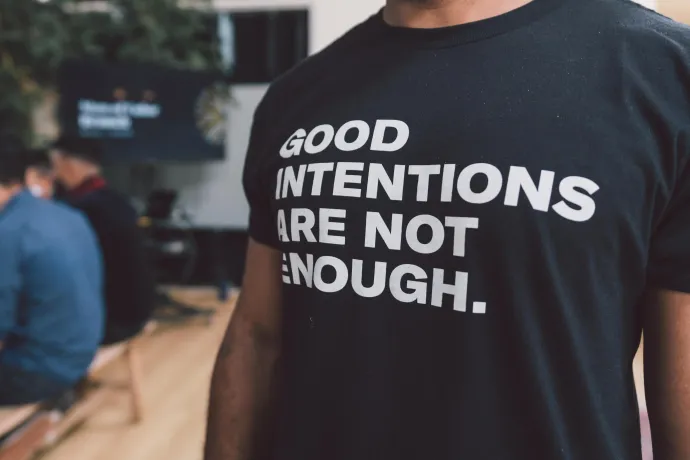Anti-Fragility: The Great Equalizer
If we are to make progress toward equality, we must get comfortable with being uncomfortable and engage in the difficult conversations. Jared K. shares some ideas about how to do that.
"For a lot of dominoes to fall, one has to fall first," says Luvvie Ajayie, in her TED Talk entitled Get Comfortable With Being Uncomfortable.
I like that. Get comfortable with being uncomfortable. Let's say it one more time: Get comfortable with being uncomfortable. Let's keep saying it until it becomes our mantra.
I would argue that the main reason why individuals from underrepresented groups continue to feel (and be) excluded, and why there continues to be marginalization of underrepresented groups in the first place, comes down to individuals from dominant groups who are in positions of power being unwilling – and often times unable – to engage in uncomfortable conversations.
Uncomfortable conversations about race. Uncomfortable conversations about gender. Uncomfortable conversations about sexual orientation, gender identity, socioeconomic status, social capital, ableism, access to resources, and any other conversation that favors one person or group over another person or group based on any perceived and/or real social, ethnic, or professional differences.
As a society, we are not comfortable having uncomfortable conversations about power and privilege and individual and systemic biases.
As a society, we are not comfortable having uncomfortable conversations about power and privilege and individual and systemic biases. We are not comfortable having these uncomfortable conversations because we lack the fluency to have these conversations. And because we lack the fluency to have these conversations, we avoid the conversations. Or we get defensive. Or we feel guilty. Or we dismiss or invalidate the lived experiences of people "not like us".
We do all these things because we are fragile. Like a piece of fine china or a model airplane that will shatter into a million pieces if we drop it, we are similarly fragile. We are intellectually fragile. We are emotionally fragile. We are afraid that if we enter into a conversation on a topic we don't know much about and with people who are "not like us" that we will be dropped onto the floor and break into a million pieces. And so to protect ourselves from breaking – from being exposed, from being vulnerable, from being wrong, from being criticized – we resort to the above tactics.
These tactics are just manifestations of fragility. Tactics that disengage. Tactics that maintain the status quo. Tactics that prevent dialogue. Tactics that prevent progress, that prevent inclusive cultures of belonging, that prevent diverse voices from being heard. It is this fragility that perpetuates inequality. And, just as the fragility is sometimes blatant and sometimes more subtle, so is the resulting inequality.
Which is all the more reason to do the work. Whether our fragility and the injustices it perpetuates is obvious or more nuanced, we have to consciously evolve – individually and collectively – toward anti-fragility if we have any hope of making inroads toward equality. In short, we have to get comfortable with being uncomfortable.
How do we do anti-fragility work? We engage in uncomfortable conversations. We listen more than we talk. We are okay with not being right all the time. We view every person as our equal. We become an ally. We adapt a beginner's mindset. We lead with curiosity, empathy, and compassion.
How do we do anti-fragility work? We engage in uncomfortable conversations. We listen more than we talk. We are okay with not being right all the time. We view every person as our equal. We become an ally. We adapt a beginner's mindset. We lead with curiosity, empathy, and compassion. We understand that our normal isn't the normal. We embrace the fact that another person's truth doesn't invalidate our own. We consciously include every person. We accept that we will make mistakes and say the "wrong" thing from time to time. We learn and grow and explore and get vulnerable.
And we share our stories along the way.
All this stuff is the work of anti-fragility. It is the work of educating ourselves about people and ideas and cultures and communities with which we are unfamiliar. It's the work of intentionally putting ourselves in situations where we are uncomfortable, with the sole aim of emerging from those situations being more comfortable with being uncomfortable. It's hard work – which is why we don't do it as often as we should.
Which is exactly why we must do it more often. "Our job is to disrupt what is happening," says Luvvie. "There are too few people willing to be the domino."
Think about that: There are too few people willing to be the domino. Which means there are too many people who are fragile. Too many people worried about breaking themselves, worried about breaking systems of oppression, worried about being uncomfortable. But, she continues, "Comfort is overrated. Being quiet is comfortable. Keeping things the way they've been is comfortable. And all comfort has done is maintain the status quo."
So will you stay fragile and comfortable? Or will you be the domino? Will you fall forward so others can too?








We encourage you to share your thoughts on your favorite social platform.